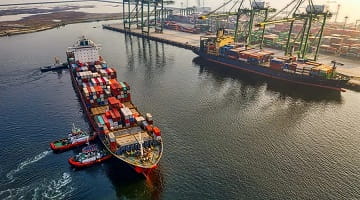2024/25 entry Applications also open for 2025/26
MSc, MSc (2 years Full-time) International Transport, Trade and Logistics
About this course
Gain advanced logistics knowledge and management skills with this MSc in International Transport, Trade and Logistics at Liverpool John Moores University.
- Study at one of the UK's leading Maritime higher education providers
- After graduating, enjoy exemptions from the Institute of Chartered Shipbrokers chartered membership examinations
- Follow a curriculum informed by world-leading research plus links with the regional Mersey Maritime cluster, and the UK-wide maritime industry
- Look forward to excellent career opportunities with logistics companies, transport companies, goods producers and suppliers, governmental bodies and consultants
- Benefit from almost 125 years of expertise in delivering professional courses for the maritime industry
- Access an international centre of excellence in maritime education, professional training and applied research
International trade is taking on even greater importance with the development of burgeoning economies within the manufacturing sector. Global trade is reliant on long distance modes of transport to connect economies with final markets and you will gain specialist knowledge of maritime transport from this programme.
This dynamic course will provide you with the tools to demonstrate a systematic and comprehensive understanding of knowledge relating to International Transport, Trade and Logistics.
You'll gain essential critical awareness of factors that influence business, financial and management strategies in the field, including markets, customers, finance, people, operations and ICT.
Using qualitative and quantitative methods, you'll learn how to find solutions to industry- related issues. You'll conduct research, using research design, data collection, analysis, synthesis and reporting techniques to develop systems and outcomes.
This programme is also available as a 2 year (240 credit) option. This consists of the standard 120 credits of taught modules plus 60 credits of MSc project, accompanied by an additional 60 credits. This can be taken as either a single semester group design project (a current module) or a sandwich placement year of 30 weeks (a current module).
Fees and funding
There are many ways to fund postgraduate study for home and international students
Fees
The fees quoted at the top of this page cover registration, tuition, supervision, assessment and examinations as well as:
- library membership with access to printed, multimedia and digital resources
- access to programme-appropriate software
- library and student IT support
- free on-campus wifi via eduroam
Additional costs
Although not all of the following are compulsory/relevant, you should keep in mind the costs of:
- accommodation and living expenditure
- books (should you wish to have your own copies)
- printing, photocopying and stationery
- PC/laptop (should you prefer to purchase your own for independent study and online learning activities)
- mobile phone/tablet (to access online services)
- field trips (travel and activity costs)
- placements (travel expenses and living costs)
- student visas (international students only)
- study abroad opportunities (travel costs, accommodation, visas and immunisations)
- academic conferences (travel costs)
- professional-body membership
- graduation (gown hire etc)
Funding
There are many ways to fund postgraduate study for home and international students. From loans to International Scholarships and subject-specific funding, you’ll find all of the information you need on our specialist postgraduate funding pages.
Please be aware that the UK’s departure from the EU may affect your tuition fees. Learn more about your fee status and which tuition fees are relevant to you.
Employability
Further your career prospects
LJMU has an excellent employability record with 96% (HESA 2018) of our postgraduates in work or further study six months after graduation. Our applied learning techniques and strong industry connections ensure our students are fully prepared for the workplace on graduation and understand how to apply their knowledge in a real world context.
The extensive range of skills provided by this MSc degree in International Transport, Trade and Logistics will enable you to move into the management of goods flow on a global scale. Potential employers include: logistics companies, transport companies involved with international trade, goods producers and suppliers, governmental bodies and consultants.
The student experience
Discover life as a postgraduate student at LJMU.
News and views
Browse through the latest stories and updates from the University and beyond
Course modules
Discover the building blocks of your programme
This course is currently undergoing its scheduled programme review, which may impact the advertised modules. Programme review is a standard part of the University’s approach to quality assurance and enhancement, enabling us to ensure that our courses remain up to date and maintain their high standard and relevancy.
Once the review is completed, this course website page will be updated to reflect any approved changes to the advertised course. These approved changes will also be communicated to those who apply for the course to ensure they wish to proceed with their application.
Your programme is made up of a number of core modules which are part of the course framework. Some programmes also have optional modules that can be selected to enhance your learning in certain areas and many feature a dissertation, extended report or research project to demonstrate your advanced learning.
Core modules
Research Methods
10 credits
The aims of this module are to develop the students’ ability to formulate a coherent and well- designed research project and associated proposal. The module also aims to develop the skills required to critically analyse and evaluate research findings and the effective presentation of the results.
Industrial Consultancy Project
60 credits
This module aims to provide you with an opportunity to work on an industrial driven project for an external (Industry) or internal (University) client to develop a solution to an open-ended problem presented by the client. It will require you to investigate a complex industry relevant work based problem, demonstrate initiative, and work together with the client to develop a design specification and project plan. You will select appropriate engineering and/or management processes and techniques to produce a solution which meets the specification.
MSc Project
60 credits
This module requires you to refine your aims, objectives and programme of work, and undertake research work with academic supervision. You will prepare a dissertation that demonstrates the appropriate application of research techniques in a suitable subject area at postgraduate level.
Project Management
10 credits
The central theme of this module is the management of projects using known standards and methodologies. It aims to develop a sound understanding of the fundamental concepts of managing projects. You are given the opportunity to develop your skills in a practical and theoretical context.
International Trade and Global Transport Systems
20 credits
This module will help you develop an understanding of the key influences affecting the international trade market, with particular reference to the impact they have on global logistics flows, and an insight into freight transport operations on an international scale, with particular reference to the role of intermodality, the law and practice in relation to export sales and the movement of goods.
Logistics and Supply Chain Management
20 credits
This module provides an insight into the principles of logistics and supply chain management with particular reference to its application in the global business environment.
Optional Modules
Operations Research
20 credits
This module introduces a set of fundamental techniques and tools to assist engineers and managers in making better decisions on real world management/business problems.
Maritime Economics and Management
20 credits
The module is designed to provide a comprehensive overview of the topics including chartering, finance, economics, management, and operational considerations, which a shipping executive could deal with on a routine basis.
Port Management
20 credits
This module provides students with an overview of the global port industry and the evolving role of ports. Students will gain appreciation of the diverse functions of port authorities and examine the public interests and commercial factors that influence the administration of ports at national level, and governance of ports at the corporate level. This module examines a range of contemporary issues in the field of maritime and port security through the analysis of a series of relevant case studies. Students are introduced to some of the overarching legislation and are able to appraise its effectiveness.
Law and Marine Insurance
20 credits
This module introduces students to core principles of law with ‘wet’ maritime law, serving as an example of how civil and criminal liabilities can arise from the marine business. Having considered these liabilities, examination is made of established principles of the Marine Insurance. Analysis of the Marine Insurance Act 1906 and the implications of the Insurance Act 2015 reforms are made using case law developments. The options for alternative policy terms available via the Institute Clauses are also reviewed.
Chartering and Carriage of Goods Law
20 credits
This module develops students understanding of legal issues through an applied examination of carriage of goods and export sales
Ship Operations and Management
10 credits
This module is designed to introduce students without a maritime background to the fundamentals of ship design and construction, emphasizing the suitability of various ship types for different cargoes and trades. It offers essential subject knowledge as a foundation for more advanced modules in the program related to maritime economics, law, and the intricate aspects of goods carriage by sea.
Professional and Leadership Skills
10 credits
This module will help you to develop an awareness of the legal and ethical framework surrounding the activities of a professional engineer. You will also gain an awareness of the Emotional Competence Framework for a professional engineer. This will help you to develop a specific set of personal and social competency skills appropriate for a professional engineer, such as adaptability, creativity diversification, leveraging diversity, political awareness, leadership and team capabilities.
Teaching
An insight into teaching on your course
Teaching methods
You will build your knowledge on this course through lectures and directed student-centred learning including case studies.
Applied learning
You will gain essential critical awareness of factors that influence business, financial and management strategies in the field, including markets, customers, finance, people, operations and ICT.
Assessment
How learning is monitored on your programme
To cater for the wide-ranging content of our courses and the varied learning preferences of our students, we offer a range of assessment methods on each programme.
On this programme you will be assessed through a combination of coursework in the form of case study reports and assignment submissions and, where appropriate, short class tests. Some modules also include testing of problem solving skills through a combination of unseen written examinations.
Course tutors
Our staff are committed to the highest standards of teaching and learning
Dr Dimitrios Paraskevadakis
Programme Leader
Dr. Dimitrios Paraskevadakis FCILT is a Senior Lecturer in Transport and Logistics at Liverpool John Moores University and the Co-Chairman of the Chartered Institute of Logistics and Transport branch for the North West England region. He combines his roles as a logistics manager and academic, with extensive industrial experience in manufacturing and retail supply chains. Additionally, he is a highly skilled project manager, having led prominent EU and UK funded research projects in multimodal freight transport and sustainable logistics.
In today’s rapidly evolving logistics, transport, trade, and global supply chain industries, it is essential for students to develop a balanced blend of practical, academic, and project management skills. While theoretical knowledge provides a strong foundation for understanding complex systems and emerging trends, hands-on experience and project management capabilities are equally critical for navigating real-world challenges. By mastering these areas, students can become well-rounded professionals who not only grasp the principles that drive global supply chains, but can also lead projects, manage resources, and apply creative problem-solving to improve efficiency, adapt to disruptions, and drive innovation. Cultivating these competencies ensures they are equipped to thrive in a competitive and dynamic field.
-
 Reader
Reader -
 Programme Leader
Programme Leader
School facilities
What you can expect from your School
The Department of Maritime and Mechanical Enginering is located in the Byrom Street site of LJMUs City Campus. In addition to specialist engineering facilities, Byrom Street has high quality lecture theatres, meeting and seminar rooms plus a large cafe and social spaces. The Avril Robarts Library is just minutes away on Tithebarn Street.
Entry requirements
You will need:
Qualification requirements
Undergraduate degree
- a minimum 2:2 honours degree in a relevant subject. Degree subjects accepted Engineering, Maritime; Transport; Logistics; Business & Management; Commerce; Accounting; Science. Chief Engineer CoC / UK Class 1 Master Mariner also considered.
Alternative qualifications considered
- A level 5 qualification and suitable work experience
or
- Applicants with an unclassified degree and significant relevant industrial experience may be considered.
or
- Other qualifications considered by the course team to be of similar academic level to the above.
or
- A non-UK equivalent qualification
International requirements
-
IELTS
- IELTS English language requirement: 6.0 (minimum 5.5 in each component)
Further information
- Extra Requirements
-
RPL
- RPL is accepted on this programme
Application and selection
Securing your place at LJMU
To apply for this programme, you are required to complete an LJMU online application form. You will need to provide details of previous qualifications and a personal statement outlining why you wish to study this programme.
The University reserves the right to withdraw or make alterations to a course and facilities if necessary; this may be because such changes are deemed to be beneficial to students, are minor in nature and unlikely to impact negatively upon students or become necessary due to circumstances beyond the control of the University. Where this does happen, the University operates a policy of consultation, advice and support to all enrolled students affected by the proposed change to their course or module.











